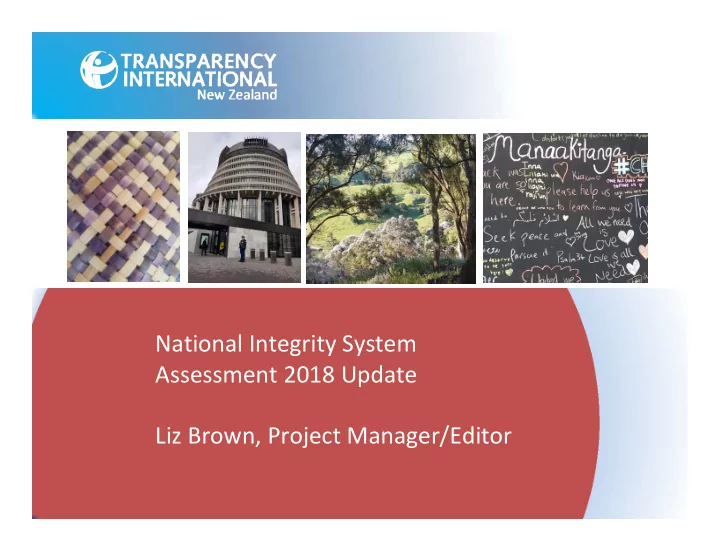

National Integrity System Assessment 2018 Update Liz Brown, Project Manager/Editor
2013 NIS Assessment Core Message It is beyond time for serious and urgent action to protect and extend integrity in New Zealand
Since 2013 – Some positives • UNCAC has been ratified • New Zealand joined the Open Government Partnership in 2013 and has developed three National Action Plans • A suite of anti ‐ corruption and organised crime legislation was passed in 2016 • Progress has been made towards more transparency in the beneficial ownership of companies and other legal entities • A review of the Protected Disclosures Act 2000 is under way. • A national anti ‐ corruption programme has been developed by the Ministry of Justice, the Serious Fraud Office and other government agencies • The effectiveness of the Ombudsman has been enhanced by a major increase in funding
Since 2013 – Some negatives • There has been little progress towards more transparency in Parliament and its administration • The problem of political party funding has not been addressed and has grown more acute. • There is slow progress in raising awareness of corruption risks or taking action to address them in the business sector or in civil society. • In most areas of policy formation, opportunities for public consultation could be better designed. It appears that government agencies are giving insufficient priority and funding to the development of expertise in and technology for public consultation. • The Treaty of Waitangi is still not formally recognised as New Zealand’s founding document or formally incorporated into New Zealand law.
Recommendation 1 The outstanding recommendations from the 2013 NIS now be implemented with high priority given to: • Strengthening the transparency, integrity and accountability systems of Parliament. • Achieving greater transparency in the appointment process for statutory boards • Reviewing public funding of political parties, • Requiring greater transparency of the finances of political parties, including donations
Recommendation 2 A comprehensive national anti ‐ corruption strategy be drawn up and implemented. Elements to include: • Implementation of the policy and practices recommended by the national anti ‐ corruption work programme • Each public sector agency with responsibility for a NIS pillar to develop a risk mitigation strategy aimed at preventing domestic corruption and protecting against offshore corruption that could impact on the daily lives of New Zealanders • The integrity of the permanent public sector to be strengthened in a range of priority areas
Recommendation 3 The government to fully implement the third National Action Plan (NAP3) for the Open Government Partnership The priority in planning and implementing NAP3 to be ensuring that government agencies fully and more deeply engage with the public and civil society organisations
Recommendation 4 The public sector to take the opportunity offered by the reviews of the State Sector Act and the Protected Disclosures Act to implement in full the relevant recommendations of the 2013 NIS assessment . And • Introduce policies to enhance and support tone at the top • Ensure that codes of conduct and guidelines are embedded, used and continuously improved, • Maintain speak up policies and procedures that include support for those who speak up and positive and prompt organisational cultural and management engagement to support the reporting of wrongdoing • Ensure policies and procedures, monitoring and greater stewardship where services are delivered by others on behalf of public sector agencies.
Recommendation 5 Media organisations to recognise the benefits to them and to society that flow from operating in a high integrity society and play their part in strengthening integrity systems The programme of the ministerial advisory group investigating the establishment of a Public Media Funding Commission to be progressed, aiming towards independent oversight of the media system and publishing of reports on the efficacy of government interventions, including funding for public broadcasting.
Recommendation 6 Civil society (non ‐ government organisations and other associations) and the business sector to recognise the benefits to them and to society that flow from operating in a high integrity society and play their part in strengthening integrity systems. Business and Civil Society to: • Use the standards set by the Institute of Directors as benchmarks for governance best practice • Adopt robust anti ‐ corruption prevention practices, taking a pro ‐ active role . • Strive to better address the massive risks to New Zealand of overseas corrupt practice through engagement in the development of a public register of ownership for all legal entities.
2018 Update Core Message The 2018 update demonstrates where this [2013] message has begun to penetrate in the public sector , but unless the tone at the top improves for business and community organisations, our country is vulnerable to overseas corruption and will continue to miss out on the resources necessary to preserve the trusted society of which we have been proud.
The full assessment and the short form are available at www.transparency.org.nz/nis
National Integrity System Assessment 2018 Update Liz Brown, Project Manager/Editor
Recommend
More recommend